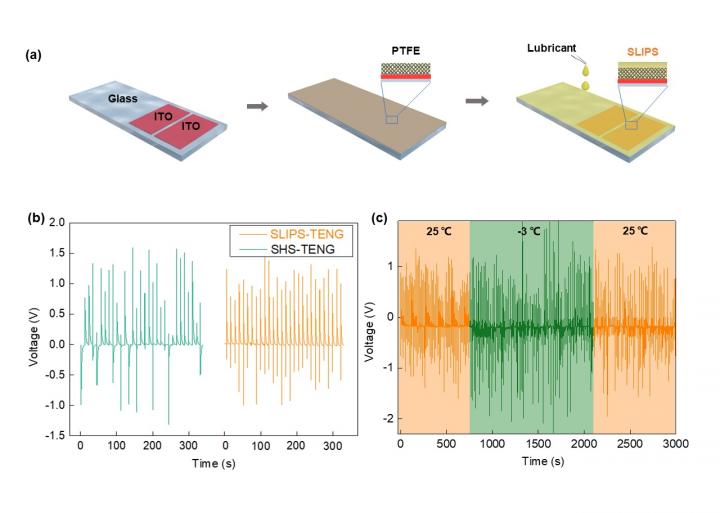
Credit: ©Science China Press
The continuous prosperity and economic growth in humankind demands new strategies to combat the grand energy challenge. Water is pervasive in our world and the scavenging of abundant, clean and renewable water-related energy is essential.
Among many approaches to harvest water energy, triboelectric nanogenerators (TENGs) that are capable of converting mechanical energy to electrical energy have received increasing attention over the past several years. However, one of the main bottlenecks for the practical implications of such triboelectric devices for water energy originates from the fast degradation of the physiochemical properties of interfacial materials at liquid/solid interfaces under harsh environments, such as low temperature, high humidity or under water condition. For example, the conventional superhydrophobic (SHS) based TENG, referred to as SHS-TENG, is limited by poor durability, undesired biofilm coverage and thereby limited energy efficiency in the long operation under harsh environments.
In a new research article published in the Beijing-based National Science Review, scientists at City University of Hong Kong, University of Science and Technology of China, East China Normal University and University of Nebraska-Lincoln present a new paradigm of TENGs that address many inherent drawbacks encountered by SHS-TENG. Different from previous works, the TENG is covered by a novel slippery lubricant-impregnated porous surface (SLIPS), referred as SLIPS-TENG. Remarkably, the marriage of a slippery and configurable liquid layer exhibits many advantages over conventional design including optical transparency, configurability, self-cleaning, flexibility, and power generation stability, in a wide range of working environments. Moreover, the SLIPS-TENG can be extended to various wearable and flexible devices to impart more versatile functionalities.
“Scientifically, we combine two seemingly different areas, i.e. SLIPS and TENG, together, and report the triboelectricity generation occurred at liquid/liquid interface.” Prof. Zuankai Wang said, “In a broader perspective, the marriage of SLIPS with TENG provides a paradigm shift in the design of robust blue energy devices that can be used as a clean and longer lifetime alternative in various working conditions.”
###
This research received funding from Research Grants Council of Hong Kong, Shenzhen Science and Technology Innovation Council and City University of Hong Kong.
See the article:
SLIPS-TENG: robust triboelectric nanogenerator with optical and charge transparency using slippery interface
Natl Sci Rev 2019; doi: 10.1093/nsr/nwz025
https:/
The National Science Review is the first comprehensive scholarly journal released in English in China that is aimed at linking the country’s rapidly advancing community of scientists with the global frontiers of science and technology. The journal also aims to shine a worldwide spotlight on scientific research advances across China.
Media Contact
Zuankai Wang
[email protected]
Related Journal Article
http://dx.




